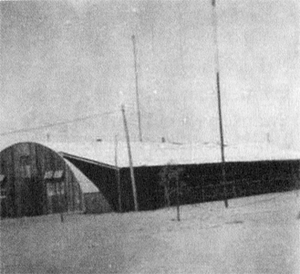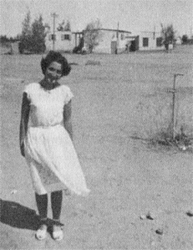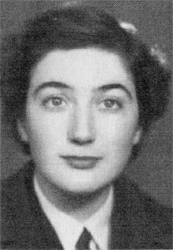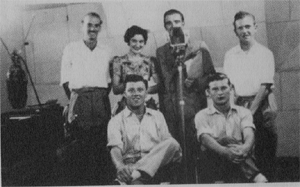I had been in Egyt just two and a half months, when I was taken ill. I had stuck out the discomfort of “Gippy Tummy” for a few days before going to Sck Bay, where I collapsed in the waiting room suffering from Dysentery. I was lying in a hospital bed in the British Military Hospital, in Fayid. I was feeling rather dozy, and fed up, and in spite of the fan whirring above, HOT. A voice said “Would you like a record request?” I opened my eyes to see a fair-haired Army Sergeant standing beside me. “I’m David Wilmott. Chief Announcer, Forces Broadcasting Service”. He smiled, took a seat beside the bed and we chatted for a while. I thought about a request and one of my favouites at that time was ‘The Intermezzo from the Jewels of the Madonna’ by Wolf-Ferrari. Unfortunately, I forgot to mention that it was the second Intermesso that I preferred.. David then got up and moved on up the long white ward to ask other patients for their requests, but it was so nice to have had a visitor, instead of just overworked hospital staff of Q.A.R.A.N.C. who had no time to stop and talk.
I lay back, when would the next jug of water arrive …. I would drink it, oh yes, because if not, as the medical saff stressed, I would have a drip put in my arm, and that I was determined to avoid if at all possible. Meanwhile the huge fans whirled around overhead, trying to keep us if not cool, just a little less hot. The relentless sun beamed in through the windows, in spite of blinds and curtains, and the sounds of the staff hurrying back and fore at their duties, was, in a way, a comforting sound.
There were quite a few other patients in the long white hospital ward, which was one of a number of the long low huts, joined by corridors. Tablets upon tablets seemed to have been thrust upon me, and they were Sulphur Grenadine, which would solidify in the kidneys, I was told, unless one drank copious amounts of water, at least 8 pints a day. I did as I was told, and drank the water, well it was decidedly better water than that in the chatty outside our R.N. Comunications building … possibly that may have been a contributary factor to my stay in hospital, in that we had that large stone chatty (jar with lid), from which we would get drinking water, as a change from tea, and because we were thirsty. It stood on the sand outside the office, to the right of the sacking curtain which hung over the entrance.
The next day my request was played, and beautiful though it sounded from the loudspeakers in the Hospital Ward, it was the wrong Intermezzo – still it was my fault for not stating that I wanted not the first, but the second one.
The routine went on in the Ward, water, water and more water, unlike ‘The Ancient Mariner’ an awful lot to drink! I was still there when David called again, during his much appreciated “requests round”, and during the course of conversation he asked “How would you like to take part in “I Know What I Like”? It’s one of our programmes where one of our 3 FBS audience is invited into the studio to present his or her choice of music? Why yes, it would give me something to think about until I got out of hospital. I can’t remember much about the programme at all, but it was on a Sunday evening at 1900 hrs.
The day at last dawned when I came out of hospital and returned to work at R.N. Commuications. Shortly after that on the following Sunday I attended the Studios, and it was great fun, enjoyment and laughter all round. After which I was asked by one of the programme producers if I would like to present one of the programmes, in my off-duty time. After I had stopped laughing I said “Are you joking?”. “No” he replied, “It’s a perfectly serious question”. “What sort of programme?” I asked and he replied: “Letters from Home”. “It’s compiled from letters written by relations and friends back home n U.K. to their loved ones, relations, and friends serving in the Armed Forces in the Canal Zone, well, in fact the Middle East. Surely you’ve heard of it?” I thought for a minute, then realized that yes, I had heard the programme quite a few times, when off duty.
He continued, “It is transmitted more or less in the same way as ‘Family Favourites’ which are broadcast on the World Service, and in U.K., but, of course our programmes are not heard there, the transmitters are just not strong enough. Also there are requests from and to friends and families in the Canal Zone, for instance the Suez Canal Company in Ismailia”.
I thought hard: why not, it may be rather interesting and possibly even exciting. It was agreed that I would have an audition and if suitable, take on the job or shall I call it “commitment”. I then had to decide what to call myself as maybe the Navy wouldn’t be too happy about me using my own name. Also I was told that the girl who had presented the programmed up until a few weeks before was “Jill” and it was felt that my name “Joy” was too similar. So I suggested names such as “Jenny Wren” – No…well then how about “Dianne Howell”? So it was agreed and it worked, but often letters came to Dianne Howe
As regards ‘Voice Training’, that was part of our training as R.N. Wireless Telegraphists and it entailed getting the tone of voice at the right level, of how can I put it? Well, liveliness, when talking to pilots of aircraft and occasionally operators like myself, on nearby ships. So there was no problem there…
So “Off Duty” after the afternnon Watch, and having been to the Mess for the evening meal, whch I may say we ate out of necessity rather than enjoyment; a ‘tilly’ (a small run-about lorry) collected me by arangement from outside Ladysmith Camp and took me to No. 3 FBS.
The buildings were the usual long army huts, well arranged, and for those days, had all the latest equipment. It was situated near to the edge of the desert, with sand all around, buzzing with flies, and of course the inevitable (and necessary) barbed wire surrounded the whole site, which consisted of a block of studios in the centre, a record library, and another library with reference books. The transmitters were further out in the desert, and well guarded.
|
|
|
The single men lived in a line of tents nearby, and there were more tents further down for the Arab cleaners, watchmen and ghaffirs. In addition there were still more tents around the studio building which were used as stores and offices. The studios though, were roomy and basic, it was well arranged, and the acoustics were fine. It was rather hot at times, as the large fan couldn’t be in action when the programme was going out on air.
I was given a pile of letters to read, and instructed on how to write a script based on the letters in front of me on the desk. After which I was told that the words and the records (which were 78’s and occasionally 33’s) would be timed so that the programme would last one hour exactly. The records required were sought out by the Record Librarian, and put ready on the desk. If they had to be substituted because the record desired was not available then, of course, much consideration was given to a suitable replacement.
The letters that were the source of the programme were sometimes touching, sometimes funny, and always different. The broadcasting was very professional, no chitchat as is common on our local stations today between announcers and others in the studio as “That excludes the person(s) to whom you are speaking” I was told. The listeners, I was told very firmly, are the people who are important – you are not, and so you talk to them, and to no one else. I think, to be honest, any female voice was enjoyed by the Forces in the Canal Zone, as there was a distinct shortage of females, and a surfeit of males there. So here I was in a Broadcasting Studio. I didn’t feel any different, it was a job that I enjoyed at the end of the day when off duty.
Certainly for “Letters from Home” there was always an announcer on duty, who would put the records on the turntables, usually there would be an engineer somewhere around, and sometimes the producer, but he would be there mainly in the daytime, not evenings. David Wilmott was at the time Chief Announcer, and a little later, when David returned to U.K., “Guy Roberts” became chief Announer. Guy isn’t his name (it is Roy), just the name under which he broadcast, and produced programmes for the next almost 40 years.
Our signature tune was “One Love” played by the David Rose Orchestra and one of the popular requests was “The March of the Belgian Parachutists” composed by Pierre Lechmans, under the direction of Lieutenant Poulain. Some records, which, because they were requested, were played far too often. It not only got on the listeners’ nerves, but ours as well – one of which was “Good Health, Good Luck, God Bless You”, we did try to cut the playing of that down but still the requests came in for that so-and-so song.
I have kept some of the much apreciated “fan
letters” from the boys – (and their parents). For instance: “From:
“The Snobs”, The Regimental Armourer, 1st Battalion Oxford and
Bucks Light Infantry, ME.L.F. 27 (Suez)
Dear Miss Howe
Please do not be offended by this letter.
We all gather round the radio to hear your request programme, lately there
has been an air of discontent in our little group.
Your voice intrigues us very much, so much in fact, it has started an argument
as to how you look. Now every time you start your Programme we all look at
each other and the argung starts once again.
There is two in our company that thinks your looks are not as good as your
Voice so please could you enlighten us a little by sending a Photograph, or
at least write back to us and settle this little disagreement we are having.
The majority DO think you are not the School Marm type, so don’t worry,
if the agrument does get a little over heated we can always put a Blanket
over their heads to quieten them down. We all hope that you will continue
to keep up the good work, this is our favourite programme and we would miss
it very much if it was stopped. Good Luck
for the Future
From: W.D. Davies for the musical Tradesmen
And I have a Christmas & New year card.
On the front is a reproduction of a picture of Thomas, Lord Wentworth, painted
in 1640, and it explains that he was appointed the First Colonel of “The
First or Grenadier Regiment of Foot Guards”…
Written inside, in splendid handwriting it says:
To Miss Diane Howell, with every good wish for Christmas
and the New year From Guardsman D. Jones, on behalf of the Orderlies of the
3rd Bn, Grenadier Gds, Deversoir, and the joy’s you have brought us
since our arrival in the Canal Zone.
I never disillusioned our listeners as to my looks, and photographs were never published, not as far as I know, of any of us at FBS, either professional or amateur. Many presumed that I was a blonde Doris Day or Marilyn Munroe lookalike where in fact I had jet black hair, not even brown, inherited from my mother’s family who were Welsh.
|
|
|



